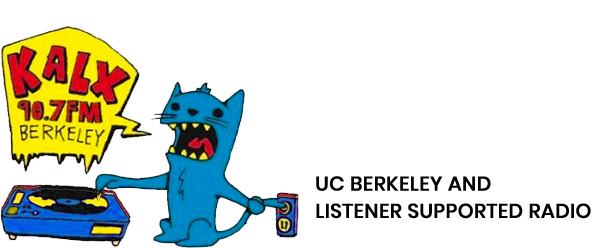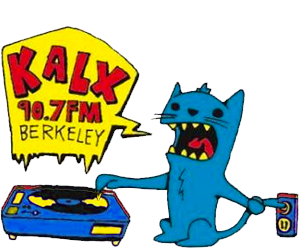The Freight & Salvage is on a little theater alley in Berkeley lined with the jazz conservatory, Berkeley Repertory Theatre, and a couple other arts centers. It’s the East Bay’s Broadway, in a way. The Freight, a non-profit venue, claims to be a coffee shop but is actually one of the most sonically advanced music halls in the Bay Area. The theater has cushioned chairs in an ascending semi-circle, and black velvet curtains that line all walls. The place is most known for inviting in folk artists from around the world to play and sometimes offer workshops. Fares, who I am sitting next to, says that it’s the right venue for EMEL to play because sitting allows the body to think through what her music asks you to engage with and hold.
Tonight the audience is multiracial and multigenerational: children sitting next to keffiyeh clad, individuals holding Palestinian flags. A rainbow of humanity gathered to see the Tunisian artist, almost opera star, almost hip hop artist, almost I’m not totally sure how to describe, but another audience member said, “goddess”,speak.
On stage, she stands in a black dress with puffy sleeves and a crown of jeweled golden leaves. Her set is cinematic, with the soundtrack to a moviescape shown on the projector behind her. Images of bombed-out houses, children playing through the rubble, police cars burning—the suffering happening to humans today.
She is like a witch; her hands cast sonic spells. When she extends the right one, the drummer bangs waves of sound, crashing into rocky shores. He stands and dances while he plays, his dreads flowing over his shoulder. When she lifts her left hand, the keyboard artist offers layers of melody, of an invisible choir, of helicopter blades, of swaying trees. Next to EMEL is a silver drum she plays while she sings. Her vocal range makes the sounds that she produces extend from almost rap to haunting whispers, still etched into my mind.
She sings in a mix of English and Arabic and offers the audience translations of the meaning behind the songs, and the stories she chooses to share. There is a century old palestinian piece she learned from women there that was sung by women standing outside British colonial jails, the notes offering hope that one day their loved ones might be free. She discusses one of her songs about dreams to describe how the ever rising walls of tyranny keep destroying dreams, but about how dreams allow us to build palaces of our mind, of love and hope and of futures of freedom we must believe in. EMEL describes through her music that dreams are not individual, but are collectively dreamt. That speaking out and collective courage are necessary to triumph over the violence of today. Humvees move through refugee camps on the screen, bombs explode from Patriot drones, while her voice flows like water, offering hope. EMEL describes that the act of music-making is the act of never giving up, and of building something new at least in our minds, of speaking freedom dreams into reality. The human voice is the most powerful instrument that she describes as she sings.
My voice roars like the wind,
My voice screams like the waves,
My voice has no limits.
She says it’s very emotional for her to be there tonight because although many of her songs were written during other times that Gaza was under violent attack, now under attack again, she sometimes wonders how to find the melodies to bridge hatred. She believes artists can and do change the world, but sometimes it’s easy to feel lost and alone. In these moments of vulnerability, Palestinian flags emerge from the audience and are waved. The video projector shows blue and green arboreal lights slithering across a dark night sky. She breaks the crowd into two sections, and we call to one another across the venue, “I will rise again”.
After the show, she stands in the lobby and has a conversation with each audience member who wishes to speak. When it’s my turn, almost an hour later, she tells me that the audience, the people gathered, the reflections in their faces, give her hope in our shared humanity. What might save us is not staying in our own corners, but the connection between us that when we vibe to a Tunisian beat that were much closer to loving each other than to hating,
The performance was put on by the Diaspora Arts Connection, a group that produces shows and offers a space for artists in the diaspora, wherever they’re from. They are hosting another show in Richmond on March 28, called Third Culture Tales, meant to bring people together and that in our “otherness,” there is shared commonality.
Review and artwork by Christopher LeBoa


